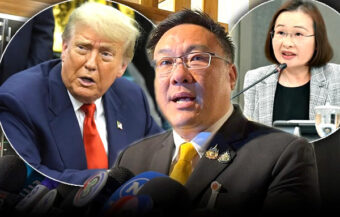Baht has been on a roller coaster ride coming from a 16-year low in October 2022 to a rapid 14.4% gain and this year seeing an 8.4% drop since January 30th as exports slump with June’s output being 6.4% down on last year amid rising concerns about significant economic malaise in China.
The Thai baht has fallen in value against the US dollar by 8.4% since the 30th of January 2023 as the kingdom finds itself being buffeted by the country’s political instability and a growing crisis linked with the Chinese economy as well as elevated interest rates in the United States. This week, at a conference in Southern Thailand, Bank of Thailand Governor Sethaput Suthiwartnarueput suggested that while the economic recovery was still intact, the bank was now focused on achieving a ‘soft landing’ as he referred to ‘cracks’ in China’s economy.

At a seminar in southern Thailand, organised by the Bank of Thailand, the Central Bank’s Governor Sethaput warned that the negative economic news emanating from China suggested that the Communist country was developing cracks in its economic infrastructure.
Mr Sethaput particularly mentioned China’s problematic real estate sector and the rapid growth in private borrowing and credit in that economy despite plummeting economic growth.
Thai firms warned by central bank boss to cut back on borrowing to support business development as credit expands in China while economic growth falters
Mr Sethaput used the occasion to warn Thai firms, at this time, to exercise caution about borrowing and the level of debt maintained in their day-to-day business activities as well as on company balance sheets.
The seminar heard the governor suggest that Thailand’s current economic recovery was still ongoing with the central bank now concerned to ensure the economy staged a soft landing in the face of economic headwinds and uncertainty.
Thailand’s current borrowing rate is 2.25% following this August’s rise of 25 basis points announced by the bank’s Monetary Policy Committee.
Mr Sethaput indicated that monetary policy going forward would be tied to the data incoming from the economy which is being directly impacted by China’s developing economic problems due to the high level of trade between the two countries and significant inward investment from China, both of which are expected to be impaired.
The figures this week that spooked the market showed China’s industrial output growth falling in July to 3.7% from 4.4% in June as well as retail sales with a disturbing headline figure making news around the world showing 21.3% youth unemployment in Thailand’s neighbour to the north.
Investor faith in China undermined as decoupling phenomenon accelerates and begins to be felt
The week has seen large US financial houses openly express a loss of confidence in China as an investment destination amid a confirmed momentum among global manufacturers who are moving production bases from China to other countries in Southeast Asia and India.
Big problem coming into view is Thailand’s over-reliance and coupling with China which increasingly looks like a bad bet for a kingdom in denial
Property market collapse in China and a Chinese economic recession is the key threat to Thailand
Ahead of the negative news from Beijing this week, the People’s Bank of China attempted to preempt the situation by announcing a 0.5% cut in interest rates, which some analysts suggest may help to alleviate some of the problems in the economy.
‘From a macro perspective, today’s policy decisions are somewhat helpful. They will help improve the debt-service ability of cash-strapped local governments and property companies,’ ING Bank explained to clients in a briefing note. ‘But this isn’t a game-changing outcome, and so we doubt that market sentiment will dramatically improve just on this.’
Capital continues to flow West and out of China as Beijing is forced to lower borrowing rates to ease pressures on indebted firms and local authorities
However, as reports on Wednesday of Chinese actors selling US dollars to buy Yuan on key international markets to prop up the Chinese currency, in what was seen as a desperate move, there are predictions that a widening gap in returns will drive liquid financial instruments out of China towards the US where interest rates continue to rise, particularly as American bonds are becoming more attractive with 10 year US Treasury yields increasing this week.
The Chief Asia Forex Officer with Japanese Mizuho Bank, a global Japanese institution with offices in Bangkok is Mr Ken Cheung: ‘We saw the ten-year US Treasury yields running high and with the People’s Bank of China rate cut, this will lead to the rate difference widening between China and the US and put the renminbi under further pressure,’ he pronounced on Wednesday.
The turmoil in the markets following the economic data from China also played into increased uncertainty about the Thai economy driven by a growing political crisis in the kingdom.
Political crisis is becoming an economic problem
In recent weeks, the election-winning, pro-democratic and progressive Move Forward Party has been shunted aside in a bid to form the next government in favour of a more traditional and conservative coalition between the second-placed Pheu Thai Party and outgoing government parties which could see current Deputy Prime Minister Prawit Wongsuwan, the 78-year-old former army chief whose party only achieved 1% of the ballot in the party list national election over three months ago with 8% of constituency seats, emerging as the country’s 30th Prime Minister.
Voting for next PM to go ahead with growing turmoil likely to end with General Prawit as PM
Chuwit says General Prawit Wongsuwan will be Thailand’s Prime Minister at the end of August
There are fears that this possibility may lead to further street protests and continued political tensions in the country, with the more moderate Pheu Thai Party, now considered a spent force, having decimated its support base because of its decision to abandon its alliance with the more progressive Move Forward coalition.
Thai baht fell to a 16-year low in October 2022 but then rose by 14.4% on foreign tourism gains to January 30th 2023 and since then has fallen by 8.4%
The Thai Baht has been particularly volatile in the last ten months, with it reaching a 16-year low against the US dollar on the 16th of October 2022 at ฿38.29.
Between then and the 30th of January 2023, the baht gained by as much as 14.40% to ฿32.79, purely based on Thailand’s full reopening to foreign tourists, but also coming at a time when the country’s exports appeared to collapse.
The baht has again fallen back to its value on Thursday at ฿35.28 by 8.4%.
This collapse in exports, which drives Thailand’s manufacturing sector accounting for 58% of the economy, saw Thailand’s output decrease by 6.4% in June compared to the year before with a 10.3% decline in imports.
On Wednesday, Mr Sethaput blamed the movement and trajectory of the baht on rising interest rates in the United States, considered by most analysts to be the key factor but also accepted that political instability in the kingdom is now playing into the currency markets.
‘Recent baht volatility is mainly driven by the movement of the US federal funds rate,’ he explained. ‘Of course, domestic political uncertainty is also playing a key role, causing pressure for back fluctuation against the dollar.’
Country still targets 3.5% GDP growth despite talk from the central bank governor of a ‘soft landing’ for the Thai economy with red lights flashing
However, the Bank of Thailand governor emphasised the country’s foreign tourism recovery and continued strength in domestic spending, as the reasons why Thailand’s GDP will grow by up to 3.5% this year.
In recent weeks, however, Thailand’s consumer confidence index fell for the first time in 14 months.
Economic danger signals emerging as politicians wrangle over who will form the next government
Mr Sethaput, on Wednesday, dismissed fears that the deteriorating Chinese economy will see fewer Chinese visitors enter the kingdom, pointing to the rise in Malaysian tourists seen this year.
This trend is coming at a cost to the foreign tourism industry, which is experiencing a 16% decline in expenditure per head compared to 2019.
Thailand is still expected to see 29 million visitors this year, with the Tourism Authority of Thailand (TAT) projecting over 35 million in 2024.
Political manoeuvre by powerful conservative forces to elect a more traditional government, reversing the election result by using the unelected Senate
All eyes in Thailand are now on the vote for prime minister scheduled for Tuesday, August 22nd when Pheu Thai’s Srettha Thavisin is expected to be nominated.
At the same time, sources within the Bangkok political grapevine are predicting that the nomination will be blocked by elements in the Thai Senate as conservative forces continue their political manoeuvre using the power of the unelected Senate to bring about a more traditional government.
Philippines lending rates are 4 points above Thailand
Thailand is not the only country suffering from China’s problems and from volatility in the markets caused by rising US interest rates and concern worldwide over raised geopolitical tensions.
The Philippine peso and the Malaysian ringgit both declined this week by 0.3% while Indonesia is also seeing a loss of economic activity with reductions in both exports and imports in July eroding into the country’s trade surplus.
Bank of Thailand to tackle household debt in new plan from 2024 which will see higher standards
On Thursday, the Philippine Central Bank voted to maintain its interest rate at 6.25%, a full 4 percentage points ahead of that set by Thai banks, which indicates the vulnerability of the Thai banking system and the economy because of the country’s elevated level of private sector debt which is expected to become the key priority of the Bank of Thailand in the year ahead as opposed to economic growth.
Join the Thai News forum, follow Thai Examiner on Facebook here
Receive all our stories as they come out on Telegram here
Follow Thai Examiner here
Further reading:
Economic danger signals emerging as politicians wrangle over who will form the next government
Bank of Thailand to tackle household debt in new plan from 2024 which will see higher standards
Politicians skating on thin ice as the economy may not be able to withstand a political stalemate
Debt crisis may be one of the top items on the new cabinet’s agenda as central bank stands ready
Potential hazard lights flashing as kingdom’s auto loans spiral into default with sky-high borrowing
Bank of Thailand governor gives veiled warning to voters on the danger posed by populist policies
Financial markets debt sell-off sending a signal to Thailand before the May 14th General Election
PM warns giveaway policies of some parties may be ‘bad karma’ for the country in the longer run
Economic recovery shaky despite strong foreign tourism as global economic outlook deteriorates
Recession fears rise as growth projections are cut and export output continues to decline in 2023
Economy faces export clogs with rules in China and ‘green imperialism’ from European Union
Vital European Union free trade deal with Thailand with stiff demands from Brussels to take time
Thailand’s financials are sound but the economy is exposed if another world banking crisis emerges
Thai economic woes grow with a 10-year high trade deficit as January exports slumped by 4.5%
Credit crunch as firms seek more bank loans with tightened lending criteria and recession fears
Even as the baht surges, Thailand faces economic recession in mid-2023 with lower earnings


















